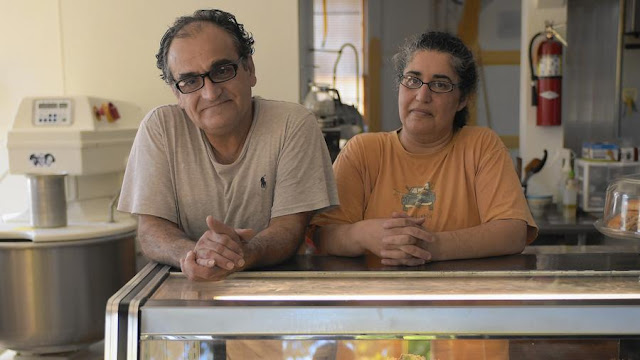You almost have to know Lighthouse Bakery is just off Mystic's touristy
East Main Street in order to find it. A rock driveway is the only clue
that there's a little bakery back where you can get some of the best
pastries of your life.
I know. I've had them. Area restaurants order their bread here.
Customers on review websites say going to Lighthouse is like walking
into someone's kitchen and asking for a sandwich, it's that homey.
Mercedeh Pourmoghadam and her husband, Massoud Kalkorhan, moved their Groton bakery here to the Stonington side of Mystic (the town boundary is Mystic's famous bascule bridge) in 2012. There were some hiccups getting their loan approved, and some odd goings-on in getting their offer to buy the property – which once served as a tile shop — accepted. They ended up contacting the Connecticut Commission on Human Rights and Opportunities and were able to iron things out.
But things never really settled down.
Since opening their business in Stonington, the couple believes they've been victims of harassment and racial profiling. An errant tenant, they allege, made some serious and violent threats (including a threat to rape Pourmoghadam in front of Kalkorhan), but police came and made no arrest. Both Pourmoghadam and Kalkorhan say they've been followed by officers on bread deliveries. They also say a town official once came to inspect their building and brought along someone who, the couple said, was introduced as a sheriff of Stonington — but Stonington doesn't have a sheriff. When the couple attempted to comply with zoning regulations and build a staircase to an office upstairs, they say a town official visited three times. A carpenter had to rebuild the stairs three times.
A Stonington police spokesman said the matter has been turned over to town attorneys. Attempts to contact the town attorney were not successful, nor were emails returned by the town official who brought along a fake sheriff. The situation became more complicated recently when Kalkhoran was charged with driving under the influence and failure to drive right. Right about now would be a good time to push the rewind button.
Pourmoghadam emigrated to the U.S. from Iran as a 14-year-old. She trained as a chemist, first at University of Albany, and then with a master's degree at SUNY-Buffalo. She returned to Iran, and she and Kalkorhan married in 1997 and came to the U.S. together the following year, with a 2-month-old son. She worked at Pfizer, but left to work in her family's bakery in 2004. That 2-month-old is now a handsome teenager, with a handsome little brother, also a teen.
How do you talk to your children about this kind of thing? "They want us out of here," said Pourmoghadam. "This is like a strangulation."
Kalkorhan says he lived through the regime of Ayatollah Khomeini. He lost family members during that time. On a Connecticut Commission on Human Rights and Opportunities form, though, he said that his family lives in fear there in Mystic. So why don't they just leave? Pourmoghadam says she wants to set an example for her sons.
"We don't believe in just because they are trying to push us out, we should leave," said Pourmoghadam. "This is very important, when you are faced with difficult obstacles, you have to be able to work through them."
Loyal customers say they've witnessed some of the bad behavior, including anonymous people coming in and interrogating Kalkorhan about his nationality and his politics, and whether he really owns the bakery, or serves as a front for something darker. You have to wonder if the owner of the popular restaurant Bravo Bravo gets quizzed like this, or the owner of any of Mystic's other popular eateries.
The latest flap is over an a-frame sandwich board that the owners put out at the end of their driveway to draw attention to their business. The town has issued a cease-and-desist order. The couple is fighting that, particularly considering the town rules seem to be applied haphazardly. On a recent Friday visit, another bakery on the Stonington side of the bridge had displayed a chalkboard roughly the size of Lighthouse's sandwich board.
Given this pattern, they've contacted CHRO again, and the American Civil Liberties Union of Connecticut, where a spokesman said the organization does not comment on prospective clients. The couple can pursue this in civil court, but that's an incredibly expensive proposition.
People are drawn to this country for its promises of freedom and opportunity, and then they insist those promises be fulfilled. In a national environment where people are on guard against this, wouldn't it be nice if this could all be resolved fairly?

Comments
Post a Comment